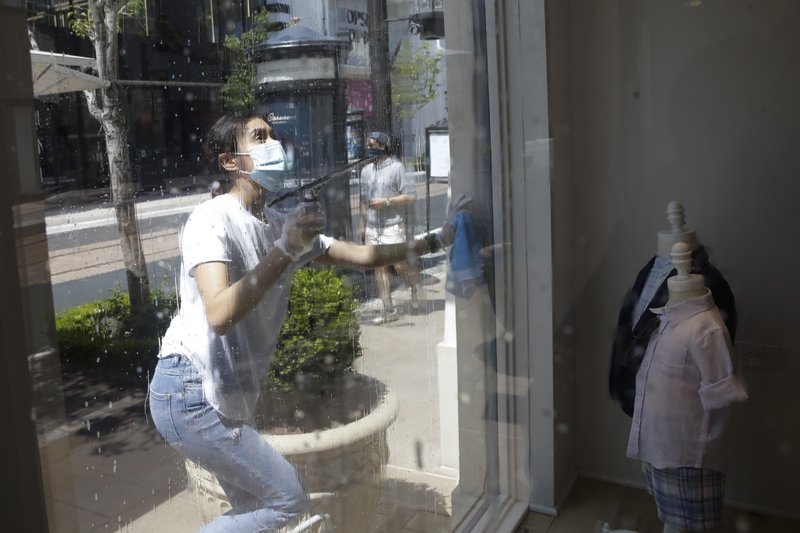
An estimated 2.1 million Americans applied for unemployment benefits last week despite the gradual reopening of businesses around the country, bringing the running total since the coronavirus shutdowns took hold in mid-March to about 41 million, the government said Thursday.
In a glimmer of hope, the overall number of people currently drawing jobless benefits in the U.S. fell for the first time since the crisis began, from 25 million to 21 million, suggesting some companies are starting to rehire.
Still, the Labor Department report underscored the continuing economic damage from the viral outbreak that on Wednesday hit a confirmed death toll in the U.S. of 100,000, more than the number of Americans killed in the Vietnam and Korean wars combined.
President Donald Trump weighed in on the figure a day later via Twitter, calling it “a very sad milestone” and extending condolences to the victims’ loved ones.
The U.S. unemployment rate was 14.7% in April, a level not seen since the Depression, and many economists expect it will be near 20% in May.
First-time applications for unemployment have fallen for eight straight weeks, as states gradually let stores, restaurants, salons, gyms and other businesses reopen and the auto industry starts up its factories again.
But the number of Americans filing for unemployment is still extraordinarily high by historical standards, and that suggests businesses are failing or permanently downsizing, not just laying off people temporarily until the crisis can pass, economists warn.
READ ALSO: Italy’s Serie A to resume June 20
“That is the kind of economic destruction you cannot quickly put back in the bottle,” said Adam Ozimek, chief economist at Upwork.
The figures come amid an intensifying debate in Congress over whether to extend $600 in extra weekly federal unemployment benefits, provided under rescue legislation passed in March but set to expire July 31.
Democrats have proposed extending the payments, while Republicans have argued that the extra money could discourage laid-off workers from returning to jobs that pay less than they are getting on unemployment.
Kelly Kelso, a 30-year-old roadie from Nashville for the rock group Foreigner, got her first unemployment check last week after more than eight weeks of waiting. She said she is still receiving far less in benefits than the $1,250 per week or more that she made on tour.
Though she is reluctant to leave the music industry, she said, “I have a cosmetology license. If all else fails, I could go back to doing hair.”
U.S. layoffs have hit some parts of the country with particular force. Nevada’s unemployment rate in April reached 28.2%, the highest in the nation. Michigan’s was next at 22.7% followed by Hawaii at 22.3%.
Economists say many of the jobs lost are never coming back, and double-digit unemployment could persist through 2021.
And as discouraging as the numbers are, the real picture may be worse. The government counts people as unemployed only if they’re actually looking for a job, and many Americans probably see no point in trying when so many businesses are shut down.
Airlines and aircraft manufacturers are struggling after air travel plummeted early in the outbreak. Boeing is cutting more than 12,000 U.S. jobs through layoffs and buyouts, many expected to be in the Seattle area. European budget airline Easyjet said it will cut up to a third of its 15,000 employees.
There was other grim economic news in Europe, where countries like France have robust safety-net programs that are underwriting the wages of millions of workers and keeping them on the payroll instead of adding them to the ranks of the unemployed.
Nissan is rolling back production in Spain in a move the government said could lead to 3,000 direct job cuts and thousands more losses at the automaker’s supplies. And French unemployment claims jumped 22% in April, with 843,000 more people seeking work.
Elsewhere around the world, India saw another record daily jump in coronavirus cases. Russia reported a steady increase in its caseload, even as the city of Moscow and provinces across the vast country moved to ease restrictions in sync with the Kremlin’s political agenda.
And South Korea reported its biggest jump in infections in more than 50 days, a setback that could erase some of the hard-won gains that have made it a model for the rest of the world.
Worldwide, the virus has infected more than 5.7 million people and killed over 355,000, with the U.S. having the most confirmed cases and deaths, according to a tally by Johns Hopkins University. Europe has recorded about 170,000 deaths.
The true dimensions of the disaster are widely believed to be significantly greater, with experts saying many victims died without ever being tested.
The post US layoffs climb to 41 million, despite business reopenings appeared first on Vanguard News.
https://ift.tt/2M9pmtL by David O Royal via Vanguard News Albert Einstein Fools of Fortune
Comments
Post a Comment